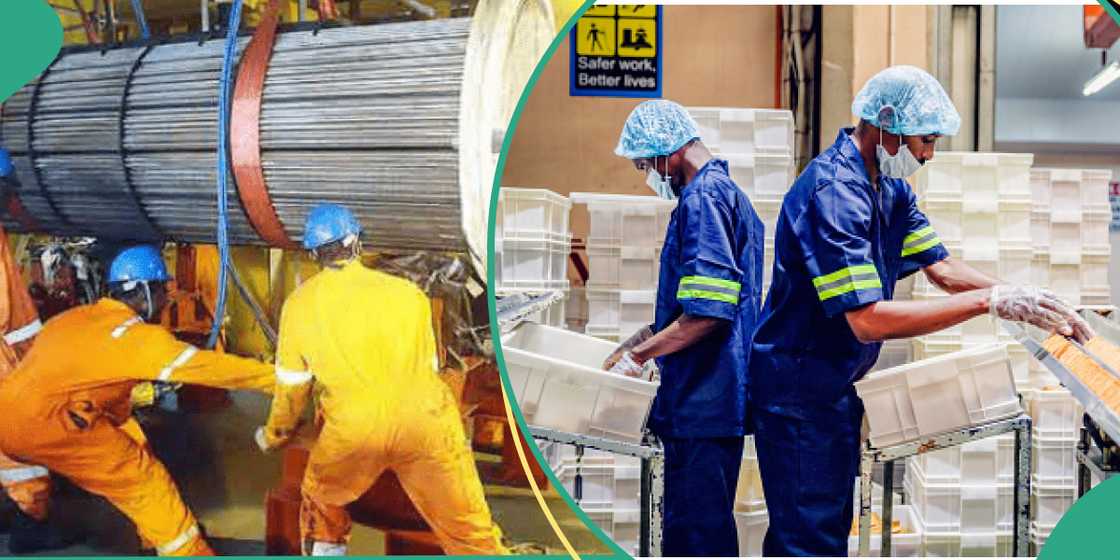The economic strain on Nigeria’s manufacturing sector has intensified, with unsold finished products skyrocketing by 357.57% in the first half of 2024 (H1’24), reaching a staggering N1.24 trillion, up from N271 billion in H1’23. This alarming increase highlights the challenges manufacturers face as consumer purchasing power weakens amid rising inflation, subsidy removal, and naira devaluation.
The Manufacturers Association of Nigeria (MAN) revealed these figures in its H1’24 Economic Review, underscoring the significant economic challenges plaguing Nigeria’s manufacturing industry. The report indicates that the drop in consumer demand has left companies struggling with large inventories, while the cost of production continues to soar.
“The massive inventory of unsold products signals the hardships faced by Nigerian consumers and emphasizes the need for targeted interventions to stimulate demand and boost sector performance,” MAN stated.
Rising Costs and Power Crisis Hit Manufacturers Hard
The manufacturing sector has been further burdened by a more than 200% hike in electricity tariffs imposed by power distribution companies (DisCos), which, coupled with frequent power outages, has forced manufacturers to turn to costly alternative energy sources. MAN reported that manufacturers spent an additional N238.31 billion on alternative power in H1 2024, marking a 7.69% rise from H2 2023, primarily due to escalating diesel and gas prices.
“The soaring costs of alternative power have added immense financial strain, with manufacturers bearing the brunt of unreliable grid supply and high tariffs,” the report added.
Calls for Urgent Economic Reforms Amid Threats to Business Stability
As manufacturing costs rise, the Nigeria Employers’ Consultative Association (NECA) has raised concerns over potential business closures, heightened unemployment, and increased social instability if the underlying economic challenges are not addressed.
Read Also: NGO trains 50 GBV survivors in Kano
“The recent surge in unsold inventory and the unstable power supply pose serious risks to Nigeria’s manufacturing sector and broader business landscape,” stated NECA’s Director-General, Wale-Smatt Oyerinde. “Local businesses are struggling, and foreign investors are likely deterred by the current environment of uncertainty.”
Import Flooding Lowers Competitiveness of Nigerian Products
Adding to the crisis, the Association of Small Business Owners of Nigeria (ASBON) noted that the removal of import restrictions has flooded the market with foreign products, undermining the competitiveness of locally-made goods. This has further compounded the sector’s challenges, with many Nigerian manufacturers finding it difficult to compete against cheaper, imported alternatives.
Sector Shows Modest Growth Despite Crisis
Despite these challenges, MAN reported a slight 2.8% increase in capacity utilization within the manufacturing sector, hinting at a degree of resilience. Investment in the sector also rose to N250.13 billion in H1’24, a 29.63% year-on-year increase, driven in part by the depreciating naira, which inflated the cost of imported machinery.
Segun Ajayi-Kadir, Director-General of MAN, commented on the sector’s struggles: “H1’24 presented significant obstacles for Nigeria’s manufacturing industry, from skyrocketing costs to dwindling consumer demand and mounting inflation. While some areas of the sector showed resilience, others have been severely impacted.”
The situation calls for immediate and comprehensive economic reforms to help Nigeria’s manufacturing sector overcome its current challenges and prevent a deeper economic downturn.






